About Us
Who is APoSD?

The Agency for the Prevention of Spontaneous Dancing (APoSD) was created as a proactive national security measure in response to the tragic spontaneous train station dance in Liverpool in early 2009, the after-effects of which are still being felt to this day.
Because of the very serious threat that it poses, rather than being apposed, we are opposed to spontaneous dancing in any way, shape, or form.
APoSD Policy
APoSD: Rising from the Ashes of Tragedy
Midmorning one day in January 2009, the Liverpool train station was overrun by a group of incognito dancers, who shocked the public with a flagrant display of spirited funky dance moves to catchy popular tunes. Since this incident, spontaneous dancing has exploded worldwide, with brief surprise takeovers of stores, public squares, parks, train stations, and other public gathering places.
We at APoSD believe that dancing is serious business. Shaking your groove thing is fine every once in a while, but it must be done when everyone knows it is going to happen at pre-determined times. There is true danger in unexpectedly having a ridiculous amount of fun.
We have gathered together a team of rigorously trained elite agents who are the product of a highly competitive selection process. We have the resources and the commitment at APoSD to keep dancing controlled and in its rightful place.
List of Mandated Dancing Circumstances
Sanctioned
- Performances: musicals, ballet, contemporary, jazz, ethnic
- Dance classes, troupes, parties, clubs
- Cheerleading squads, drill teams, dance teams, and spirit and glee teams
- Religious dancing: whirling dervishes, temple, fancy dancing ("Getting Happy" under investigation)
Pending Decision
- Carnival/Carnivale/Mardi Gras
- Capoeria and any other martial art practiced to music
- Break and hip-hop dancing
- Sport sack-dances
- Quasi-choreographed personal greetings (use of "The Bump" is under a dedicated task force review)
Strictly Verboten
- Impromptu boogying, shimmying, or hip-shaking
- Extemporaneous dancing in public areas, especially in train stations, street intersections, parks, beaches, sidewalks, rooftops, and bridges
- Dance fights/dance-offs - getting "served" and/or being the server
-
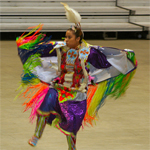
OK: Fancy Dancing
-
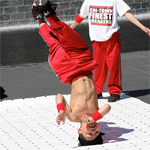
Pending: Breakdancing
-
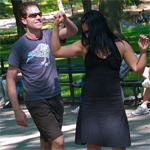
Right out: Park dancing
All groups and venues must be registered with APoSD. Circumstances listed apply to those both professional and amateur unless otherwise noted.
We are always accepting new categories of dancing for review. Read the full set of criteria for acceptable forms of dance.
Origins
Historical Roots of Spontaneous Dancing

Scholars suggest that spontaneous dancing (SD) has its roots in children's games, notably those such as "Ring Around the Rosey" and "Simon Says." But from innocent beginnings can come unpredictable outcomes. We all know what happens after a pocket full of posey: it's ashes and we all fall down.
While they may seem harmless, games such as these lay a foundation for future tendencies toward spontaneous dancing. Just as your parents always warned you: it's all fun and games until someone pokes an eye out.
The Dangers of SD
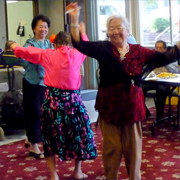
Spontaneous dancing looks benign, nay, even delightful at first glance. However, all of the surface fun and ebullience that it imparts actually masks the underlying dubious tenets of spontaneity, love of fun, and the sheer joy of being alive. Spontaneous dancing often causes huge smiles, laughter, and enjoyment, all of which is highly contagious.
Freely expressing and epitomizing joyous thoughts and feelings -- even if only for a few minutes -- is extremely risky behavior. It is for this reason that we take our role so seriously: to protect the public from SD and its far-reaching effects.
It is our goal to keep outbreaks of SD to a minimum at present, and for as long as we are able.
APoSD NEWS
Top Story
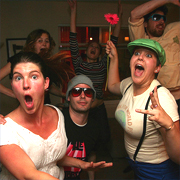
Recent YouTube Uploads from Train Station Dance Trigger PTSD-like Symptoms
Approximately one year since tragedy struck, just as the public was finally starting to forget the lingering traumatic memories of the joyous train station dance, the lastest crop of spectator-uploaded YouTube videos illicits a unexpectedly strong emotional response...
read more>
Other Stories
- 100 Single Lady SD-ers Sashay Through Picadilly Square Without Recourse
- Security Measures at Trains Stations Increased Worldwide, All Boom Boxes Confiscated
- Stop Hammertime: LA Clothing Store Overrun by Crowd in Gold "Hammer" Pants
- How Do You Solve a Problem Like a Train Station in Antwerp? Belgium Latest Victim to SD
- German Telecom Company Entering Trial for Sponsoring and Promoting SD for Commercial Gain
- Worldwide Thriller SD Gives Credence and Raison D'Etre to New Agency
- Hundreds of New Bystander-Victims Surface in Liverpool
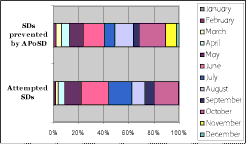







 Send email to:
Send email to: